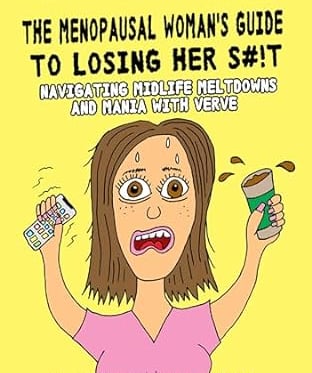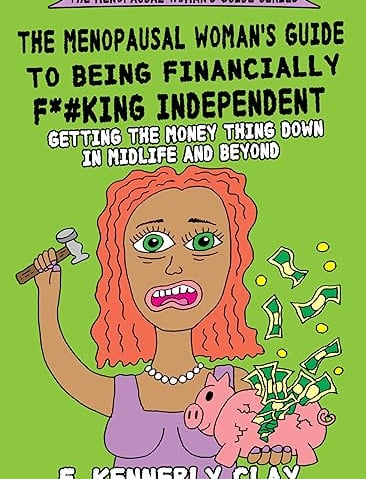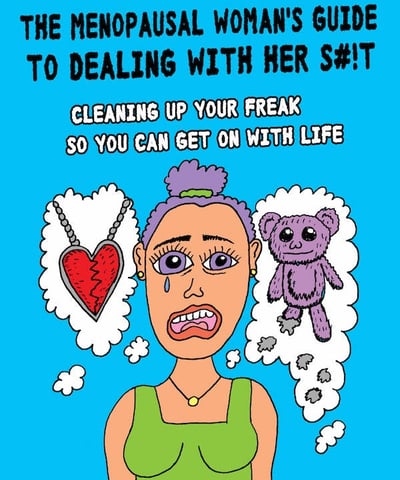What to Do About Menopause Depression
It's hard when you're already overwhelmed by symptoms, then menopause depression sinks in. ✔️ But it might be temporary, and here's what you can do about it.
MENOPAUSAL SYMPTOMSMENOPAUSAL DEPRESSION
Kennerly Clay
5/20/20245 min read


What can I do about menopause depression?
Menopause depression occurs during the menopausal transition and is closely linked to the hormonal upheavals that characterize this phase. It's not just your imagination.
If you're asking, "What can I do about menopause depression?" you're definitely not alone in your menopause and mental health journey! Many women experience mood swings and anxiety during this time. The good news is that there are effective ways to cope with menopause depression. Simple lifestyle changes like exercise and good nutrition, along with seeking support, can make a big difference
According to the Mayo Clinic, "Hormonal changes during menopause can have a significant impact on mental health, leading to symptoms such as mood swings, irritability, and depression."
Hormonal havoc: Why you feel the way you do
During menopause, the body undergoes significant hormonal changes, particularly in the levels of estrogen and progesterone. These hormones play a vital role in regulating mood, and their fluctuation can lead to emotional instability. The National Institutes of Health (NIH) points out, "Estrogen has a direct effect on the brain's serotonin levels, a neurotransmitter commonly linked to mood regulation. A drop in estrogen levels can lead to decreased serotonin production, contributing to feelings of depression."
The hormonal changes experienced during menopause not only affect physical health but also significantly impact mental health. As estrogen levels decline, many women report experiencing mood swings, anxiety, and depressive symptoms. These symptoms can be exacerbated by other menopausal symptoms such as hot flashes, sleep disturbances, and fatigue. Treating menopause depression often involves treating other symptoms of menopause as well.
Understanding the link between menopause depression and hormonal changes can help in addressing the emotional and mental health challenges faced during this transitional phase. Recognizing that these feelings are a natural part of menopausal upheaval can provide a sense of relief and encourage you to seek appropriate treatment and support.
If you or someone you know is in crisis, please call 988, the Suicide & Crisis Lifeline in the United States.
Menopause depression therapies and treatments
Menopause depression can be challenging, but there are various medical and non-medical treatments available to help manage its symptoms. One of the primary treatments for menopause depression is hormone replacement therapy (HRT). HRT aims to replenish the estrogen and progesterone levels that decline during menopause, which can alleviate both mood swings and depressive symptoms. It's crucial, however, to weigh the benefits and risks of HRT with your healthcare provider, as it may not be suitable for everyone.
Bio-identical hormone therapy (BHRT) is another potential treatment for women dealing with depression in menopause. BHRT can help relieve symptoms of overwhelming fatigue and brain fog - feelings that can lead to low mood and trigger depression.
Another common treatment for menopause depression involves the use of antidepressants. Selective serotonin reuptake inhibitors (SSRIs) are often prescribed and have been shown to be effective in managing depressive symptoms. During my early- to mid-menopausal years, I was on a cocktail of Prozac and Wellbutrin and Gabapentin, all of which boosted mood, mental focus and energy - to some extent. I also found cognitive-behavioral therapy (CBT) to be another effective option. CBT is a type of talk therapy that helps patients develop coping strategies and modify negative thinking patterns, thereby improving emotional well-being.
Ultimately, I found that antidepressants and talk therapy could only help so much. I opted for ketamine therapy for depression, an alternative approach to treating my symptoms.
When to seek professional help
If you're reading this, there's a good chance you're ripe for professional help. If you experience persistent sadness, loss of interest in activities, unmanageable mood swings, feelings of hopelessness and doom, or other symptoms that interfere with daily life, it's imperative to consult a healthcare provider. A tailored treatment plan for menopause depression can vary significantly from person to person. Your healthcare professional can conduct a thorough assessment to determine the most appropriate treatment options, whether that includes medication, therapy, or lifestyle changes.
Note: If you notice any signs of severe depression, such as thoughts of self-harm or suicide, immediate professional intervention is necessary. Seeking professional help for menopause depression is not only beneficial for symptom management but also for improving overall quality of life. Always consult with your healthcare provider to develop a comprehensive and personalized treatment plan.
Exercise: Your new best friend (gag)
Engaging in regular physical activity is one of the most effective lifestyle changes for menopause. It's also one of the last things you fucking feel like doing at the end of a long day or when you're just totally out of sorts because of menopausal (and midlife) "stuff."
But as you know, exercise helps release endorphins, the body's natural mood elevators, which can significantly alleviate symptoms of menopause depression. Whether it's a brisk walk, a yoga session, or a full workout at the gym, incorporating at least 30 minutes of exercise into your daily routine can make a substantial difference. If structured exercise feels overwhelming, start with simple activities like dancing around your living room or gardening, which are also beneficial. Consistency is key to experiencing the long-term benefits of physical activity.
So take it small, keep it light, don't make a big fuss about it. Just add a single, healthy activity to your day or week, for starters.
Eat your way to a better mood
Diet plays a crucial role in managing menopause depression. Opt for a balanced diet rich in fruits, vegetables, lean proteins, and whole grains. Incorporating omega-3 fatty acids, found in fish like salmon and mackerel, as well as flaxseeds and walnuts, can be particularly beneficial. These nutrients have been shown to support brain health and mood regulation. Additionally, reducing the intake of processed foods, sugar, and caffeine can help stabilize blood sugar levels and reduce mood swings. Staying hydrated and moderating alcohol consumption are also essential aspects of dietary self-help tips for menopause depression.
If you're having a hard time managing your appetite (as in, runaway weight gain and constant gnawing hunger), it may make sense to opt for medical weight loss and management. I've had tremendous success and a good experience with semaglitude for menopausal weight gain. Talk to a healthcare provider who understands your concerns and can facilitate medical weight loss, if appropriate.
Mindfulness and relaxation techniques in menopause
Mindfulness and relaxation practices are powerful natural remedies for menopause depression. Techniques such as meditation, deep-breathing exercises, and progressive muscle relaxation can help manage stress and improve emotional well-being. Consider incorporating a daily mindfulness practice, even if it's just for five minutes. Guided meditation apps or following along with online videos can be a helpful start. Yoga or Pilates are excellent options that combine physical activity with mindfulness, promoting both mental and physical health. Additionally, creating a calming bedtime routine can improve sleep quality, which is often disrupted during menopause and can contribute to depression.
While these self-help tips for menopause depression can be incredibly beneficial, they are not a substitute for professional medical advice. If you are experiencing severe symptoms, it's imperative to seek guidance from a healthcare provider.
Wanna talk more about depression in menopause?
Books for women who are losing it in menopause
Mental Health
Losing your mind in peri/menopause?
The menopausal woman's guide series
Financial Health
Had enough of financial insanity?
Personal Growth
Triggers? Old stuff kicking up?
Related topics
Explore helpful articles, tips, and advice for women who are losing their shit in menopause.
Community
Stay Connected
© 2024. Eclectic Content, Inc. All rights reserved.






